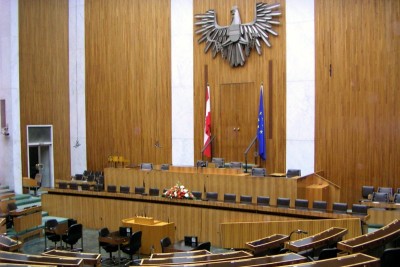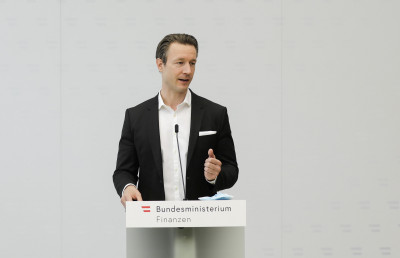Sponsored Content
Budget Deficit

Vienna Budget Turnaround: Deficit Surprisingly Shrinks to €2.8 Billion
The federal capital's 2025 financial year is taking an unexpected turn. According to the latest forecasts from Mayor Michael Ludwig's (SPÖ) office, the budget deficit will be significantly lower than originally feared at €2.8 billion. While the city government is hailing this as a success, the opposition is voicing sharp criticism.
January 25, 2026

After Deliberations, Austria's Government Presents Billion-Euro Package in Mauerbach
In a two-day closed-door summit, the federal government, consisting of the ÖVP, SPÖ, and NEOS parties, set the course for 2026. With the formula “2-1-0”—two percent inflation, one percent growth, and zero tolerance for violations of the law—the team led by Chancellor Christian Stocker aims to lead Austria out of economic stagnation.
January 14, 2026

Austria On Track: EU Commission Accepts Deficit Plans Despite Surprises
As part of its autumn package for the European Semester, the EU Commission has given Austria a positive assessment of its progress in the ongoing deficit procedure. Despite the expected higher budget deficits, particularly in some federal states, Vienna is certified to be on track to comply with EU requirements. No new requirements are expected for the time being. At the same time, the government's eagerly awaited industrial strategy is coming into focus, with leading economists calling for a “European dimension.”
November 25, 2025

Finance Minister Marterbauer optimistic: 2026 Budget Target of 4.2 Percent Deficit Remains in Place
Despite turbulence in local government, Austria is sticking to its budget target for 2026. At a press conference yesterday, Finance Minister Markus Marterbauer (SPÖ) expressed optimism that the overall government deficit would be 4.2 percent of gross domestic product (GDP), as agreed with the EU.
October 16, 2025

Austria's Budget Deficit One Billion Higher Than Expected
The Austrian economy faces far-reaching challenges: while the overall government budget deficit for 2025 is forecast to be one billion euros higher than originally assumed, massive bankruptcies, including that of Süba AG and the Höhrhan Group, are shaking the real estate and automotive supply industries.
October 5, 2025

EU Initiates Deficit Procedure Against Austria: Finance Minister Marterbauer Remains Confident
The European Union has officially initiated an excessive deficit procedure against Austria. This step, based on a recommendation by the European Commission, was decided at a meeting of EU finance ministers in Brussels. The reason for the procedure is that Austria's budget deficit, at 4.7 percent of GDP last year and a planned 4.5 percent this year, is significantly above the 3 percent limit set in the Maastricht criteria.
July 10, 2025

Austria's Economy: End of Recession in Sight, but Recovery Remains Fragile
After two years of recession, a turning point appears to be on the horizon for the Austrian economy. This is according to leading economic research institutes WIFO (Austrian Institute of Economic Research) and IHS (Institute for Advanced Studies), which have raised their forecasts for 2025 and now expect economic output to stagnate or grow slightly. Nevertheless, both institutes warn of ongoing risks and only a modest recovery.
June 26, 2025

EU Commission Recommends Deficit Procedure Against Austria
The European Commission has formally recommended initiating EU deficit proceedings against Austria. This step, which is to be finalized at a meeting of the Council of Economic and Finance Ministers in Brussels on July 8, follows Austria's exceeding the deficit limit set out in the Maastricht criteria.
June 25, 2025

Austria Raises a Further 1.5 Billion Euros via Federal Bonds
The Republic of Austria has successfully placed federal bonds with a total value of 1.5 billion euros on the capital market. According to the Federal Financing Agency (OeBFA), demand for the securities was once again high - a sign of continued confidence in the Republic's creditworthiness.
May 6, 2025

Taxes Rising, Deficit Growing: Austria Faces EU Criminal Proceedings
Austria is threatened with EU deficit proceedings - at 4.7 percent of GDP, the budget deficit is well above the Maastricht limit. To counteract this, the federal government is taking the first noticeable steps - above all, tax increases on tobacco, betting, e-vehicles, and court fees. However, experts warn that the road to budget consolidation is rocky and politically explosive.
April 1, 2025

Austria's Budget Crisis: Between Austerity Measures and Deficit Procedures
The Austrian government is facing one of the biggest financial challenges in recent years: the budget deficit, originally estimated at 6.4 billion euros, has almost doubled according to current forecasts and could reach up to twelve billion euros. This dramatic development forces the coalition of ÖVP, SPÖ, and NEOS to rethink their austerity plans and possibly face an EU deficit procedure.
March 31, 2025

Austria Threatened by Recession: Finance Minister Marterbauer Warns of Difficult Year Ahead
Finance Minister Markus Marterbauer (SPÖ) made a grim forecast for the Austrian economy at a meeting of the EU Economic and Financial Affairs Council (ECOFIN) in Brussels. According to Marterbauer, the country must expect a recession in 2025. This could have far-reaching consequences for the budget and the government's ability to act financially. Despite this negative development, the federal government is sticking to its goal of avoiding an EU deficit procedure.
March 12, 2025

ÖVP and SPÖ Achieve Breakthrough in Budget Negotiations
In the ongoing coalition talks between the Austrian People's Party (ÖVP) and the Social Democratic Party of Austria (SPÖ) without a mandate to form a government, a significant agreement has apparently been reached. According to several media reports, the two parties have been able to agree on a joint budget for the coming years. Official confirmation is still pending, but there are increasing signs that the negotiations are entering the home straight.
February 20, 2025

Austria's Initial Federal Deficit for 2024 Better Than Expected
Austria's federal deficit for 2024 ended up being 1.7 billion euros lower than initially forecast, standing at 19.1 billion euros. This positive outcome comes despite economic challenges, with lower-than-expected government spending helping offset revenue shortfalls.
February 9, 2025

Coalition Negotiations Between FPÖ and ÖVP Enter Decisive Phase
The coalition negotiations between the Freedom Party of Austria (FPÖ) and the Austrian People's Party (ÖVP) are reaching a critical juncture. According to party sources, FPÖ leader Herbert Kickl and ÖVP chairman Christian Stocker are meeting today and tomorrow in a smaller circle for discussions. The goal is to overcome unresolved issues and lay the foundation for a joint government. However, differences remain significant.
February 3, 2025

Aging Population Might Cause Debt Problems in the Future for Austria
The Austrian Ministry of Finance published a budget prognosis for the upcoming 30 to 40 years. The financial future looks bleak in Austria. More specifically, the level of debt will be rising in the next years due to an aging population.
January 5, 2023

Economic Outlook for Austria until 2024
Strong economic rebound amid high uncertainty about impact of Covid-Omicron variant. Find out what the economic future holds for Austria until 2024.
February 2, 2022

Austria Presents Financial Budget for 2022
Austrian Finance Minister Gernot Blümel presented Austria's draft financial budget for 2022 to the Austrian Parliament in the form of the annual budget speech. The plan includes tax reforms, budget increases for various ministries, estimates regarding the COViD-19 crisis, and more. Read some of the specific provisions in the budget outlined by the finance minister.
October 14, 2021

Statistics Austria: Highest Public Deficit Since Records Began
Due to the Covid-19 pandemic, Austria has recorded its highest public deficit since the start of the record in 1954. The deficit in 2020 amounted to 8.9 percent of the GDP (EUR 33.2 billion), which was caused by a sharp increases in government spending and a decrease in government revenue.
April 1, 2021

Corona Short-Time Work in Austria Is Extended
Austria's Labor Minister Martin Kocher has announced a new phase for the so-called Corona Short-Time Work in Austria valid from April 1, 2021, to June 30, 2021. The conditions of the new phase are similar to the current regulations. The aim for after June is to gradually phase-out the short-time work where possible.
February 17, 2021

Austria's National Budget: EUR 22.5 Billion Deficit
The Covid-19 crisis has severely impacted Austria's economy and national budget. The Ministry of Finance has issued its financial results for the year 2020, which shows a deficit of EUR 22.5 billion. Higher expenditures for measures in connection with Covid-19 and a decrease in public levies are the main reasons for the bad results.
February 3, 2021

Austrian Government Plans Deficit of EUR 22.6 Billion
Due to the ongoing Covid-19 pandemic and the resulting economic crisis, the Austrian government has agreed on a budget that plans with a deficit of EUR 22.6 billion for next year. Estimated lower revenues due to the weak economy on the one side face higher expenditures because of the subsidies for various businesses on the other.
November 20, 2020

Blümel Presents Budget With EUR 21 Billion Deficit
Austria's Finance Minister Blümel presented the budget draft for 2021 to the National Council. Due to Covid-19, a deficit of over 20% is planned to provide enough aid for the struggling economy and job market in Austria. While the Federal Ministers show signs of relief with regard to the major budget increase, the opposition parties are furious.
October 14, 2020

Public Deficit Amounts to 9.4%, Public Debt to 82.6% of GDP in First Half Year of 2020
Austria's government has lost its successful path to a lower public deficit due to Covid-19. In the first half year of 2020, the public deficit amounted to 9.4% while public debt rose to 82.6%. The outlook for the second half of 2020 is not much better and an increase of public debt is expected.
September 30, 2020

Corona Short-time Work in Austria: Funds to be Increased to 12 Billion
Minister of Finance Gernot Blümel announced that the budget for coronavirus short-time work will be increased from ten billion to twelve billion euros.
May 19, 2020

Austria's Double Budget 2018/2019 - Cautious Optimism
Finance Minister Hartwig Löger (ÖVP) presented his first budget. Austria's new federal government wants to earn more than it spends. The double budget for 2018 and 2019 should herald a new era. The Austrian state has been spending more than it takes for 65 years and this is to be reversed for the first time in 2019. Debt policy is to be ended. A budget surplus of 541 million euros is to be achieved and thus a turning point in budget policy. Most money should be spent on pensions, least on health.
March 22, 2018

Austrian Government Presents Double Budget 2018/19: EU Requirements Are Met - 2019 Balanced Budget
The new Austrian government is planning a zero deficit for next year, Chancellor Sebastian Kurz (ÖVP) and Vice-Chancellor Heinz-Christian Strache (FPÖ) have announced. The planned reduction in corporation tax could be of interest to foreign investors and companies.
February 28, 2018

Hypo Group: Shady Deals with Balkan Diplomats
The Austrian problem bank Hypo Group has troubles recovering debts.
May 3, 2014

Majority of Czech Entrepreneurs Want Euro
According to a survey, more than three quarters of Czech entrepreneurs are in favor of the country adopting the Euro.
April 30, 2014

Spindelegger: “Arsonists Are to Blame Not Fire Brigade”
The downsizing of ailing bank Hypo Group Alpe Adria is a heavy burden for this year’s budget. According to Finance Minister Spindelegger, the deficit comes at 2.7 percent of GDP while public debts will soar.
April 29, 2014

Hypo Group: Huge Burden for Austrian Budget
The downsizing of problem bank Hypo Group Alpe Adria is a huge burden for this year’s budget.
April 29, 2014

Austria: Is Spindelegger Suitable as Finance Minister?
On Tuesday the Austrian Finance Minister will hold his first budget speech. Initial figures reveal record debt levels.
April 28, 2014

Serbia: New Government Taking Drastic Measures
New head of the Serbian government Aleksandar Vucic has ambitious plans to reform the state and restructure state finances.
April 28, 2014

Budget Deficit: Austria Threatened with Penalty
Due to the capital injections into the distressed lender Hypo Group, Austria´s 2013 budget deficit will exceed the 3.0% threshold. According to Finance Minister Spindelegger, Austria might face an excessive deficit procedure.
April 25, 2014

Croatia Faces Radical Fisal Measures
The fiscal situation of the Balkan country and youngest EU member state is disastrous. The Croat government announced to introduce new taxes.
April 25, 2014

Austrian Public Debt Almost at 80% of GDP
The Austrian public debt burden will reach a new all-time high at the end of the current year. The challenging fiscal situation is partly attributable to the capital injections into Hypo Group Alpe Adria.
April 24, 2014

Poland: Budget Deficit Soaring
Last year the budget deficit amounted to 4.3 percent of GDP.
April 17, 2014

Poland: Excessive Deficit Procedure for Two More Years
The Polish government expects the EU Commission to cancel the Excessive Deficit Procedure in “less than two years” due to the measures applied so far the continuing of economic recovery.
April 16, 2014

Serbia: “Radical Measures” Needed to Tackle Grey Economy
Experts call for higher penalties to make tax evasion and gray economy less profitable and establish financial discipline.
April 14, 2014

Poland: No Tax Hike Required
According to Poland’s Finance Minister, a tax increase is not required this year.
April 14, 2014

Austria: Government Wants “Restrictive Budget Performance”
Today the Austrian government has decided upon a “restrictive budget performance.
April 8, 2014

Hypo Group: Heavy Burden for Austrian Fiscal Position
The Austrian National Bank, however, expects the structural medium-term budgetary objectives to be achievable.
April 7, 2014

Slovenia: Budget Deficit to Jump to 14.7%
Due to the bank bailout, Slovenia´s budget deficit is expected to reach 14.7% of GDP in 2013.
April 2, 2014

Czech Republic: Euro Support Still Weak
Almost a quarter of Czech citizens support the idea of joining the single European currency union.
April 2, 2014

Austria: Spindelegger Expects Significant Increase of Deficit
According to the Finance Minister, the consequences of the Hypo-disaster are “dramatic”. However, he does not see a danger of deflation.
April 1, 2014

Slovenia: Danger of Tax Increase
Because of the failed introduction of the property tax Finance Minister Uros Cufer suggested an inrease in VAT to compensate for the losses in revenue.
March 31, 2014

Austria: State Revenues Increased
In 2013 the Austrian budget deficit came at 1.5 percent of GDP wile public debts increased to 74.5 percent of GDP.
March 31, 2014

Slovenia: Controversial Property Tax Fails
The Slovenian Constitutional Court has rejected the controversial property tax suggested by the government. This will jeopardize this year’s budget.
March 28, 2014

Poland to Fulfill EU Commission’s Regulations
According to Polish Finance Minister Mateusz Szczurek, Poland will have no difficulties fullfilling the standards set by the European Commission with regard to the budget deficit.
March 27, 2014

Austria: Economic Growth Slowly Getting in Gear
Wifo (Austrian Institute of Economic Research) projects economic growth in Austria to revive again only at the end of this year.
March 27, 2014


